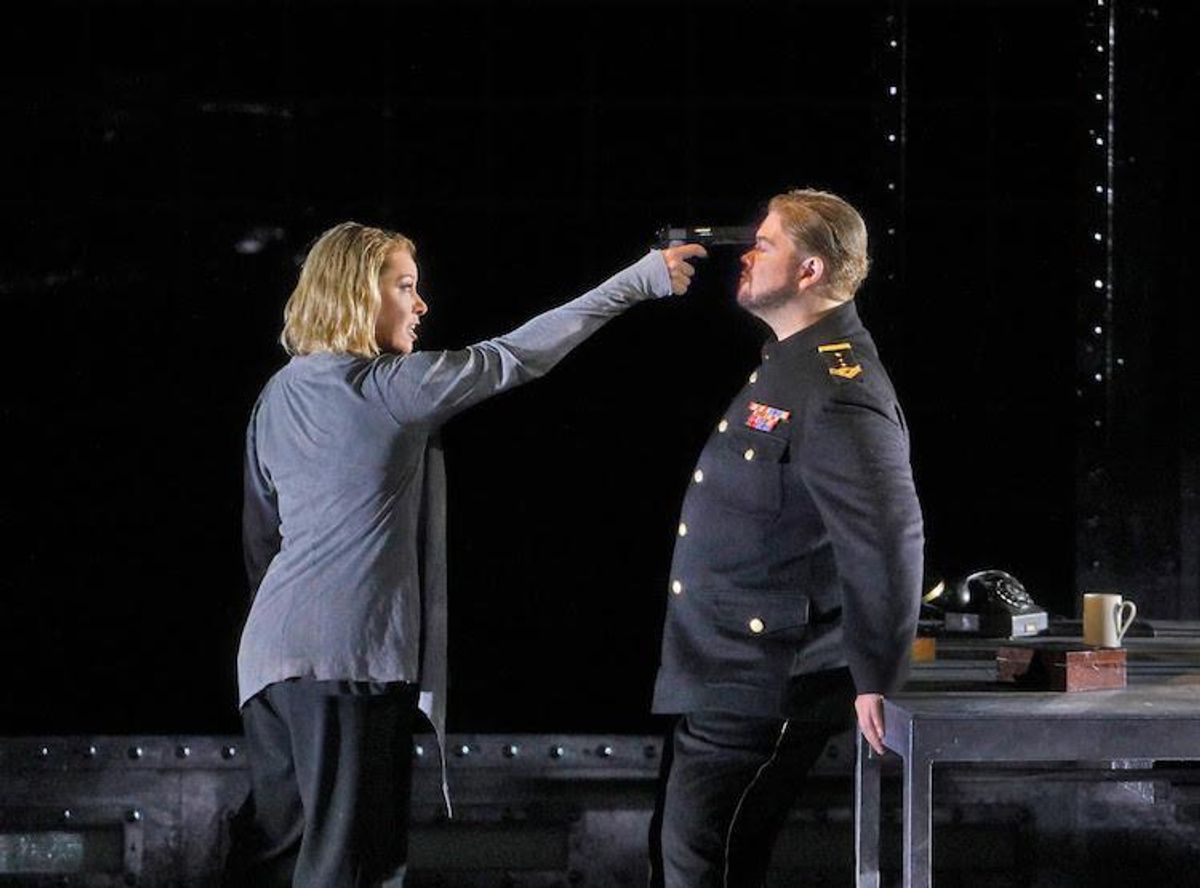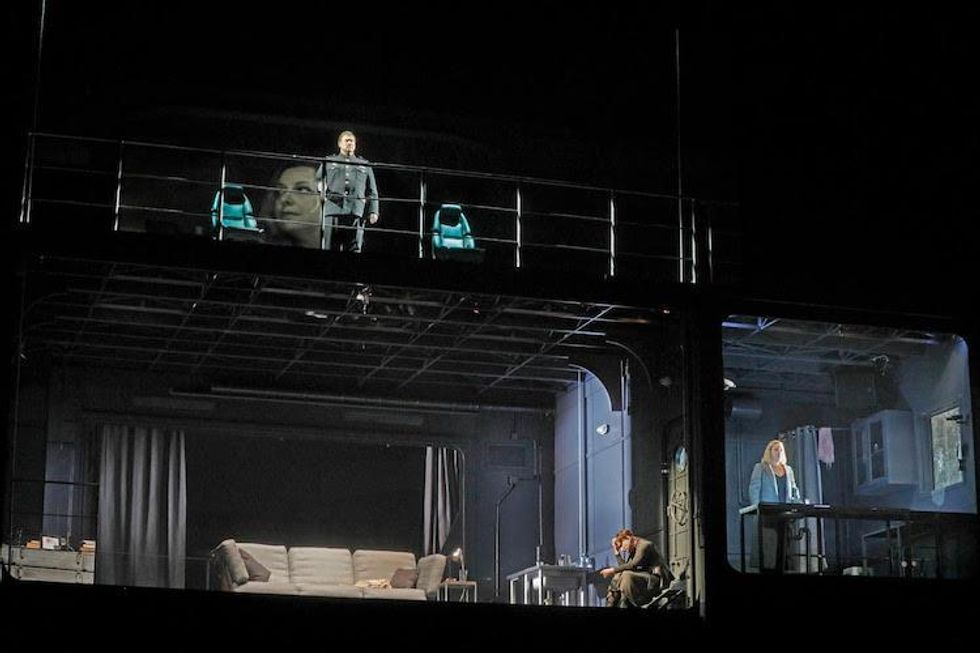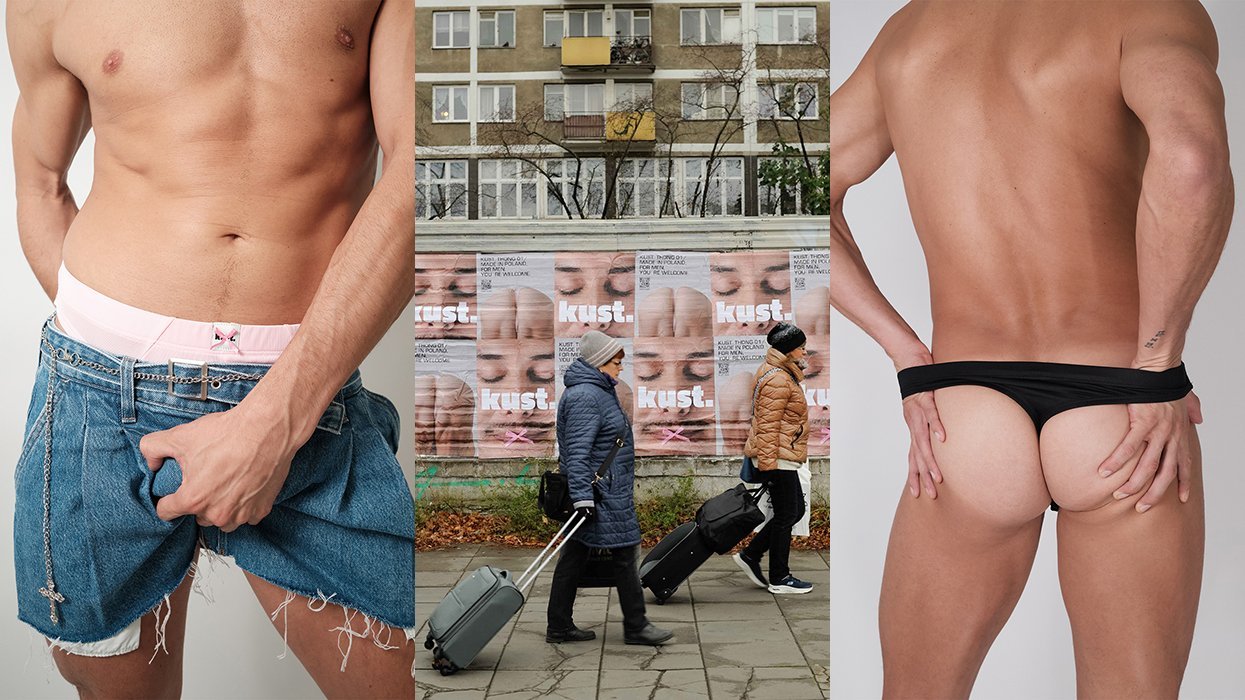From Left: Nina Stemme as Isolde, Stuart Skelton Tristan in Tristan und Isolde
The opera is generally a safe space for gay couples to openly show their affection. But at the Met's gala opening of Wagner's Tristan und Isolde, it was the first time I saw several same-sex couples actually hold hands as they waited in the lobby before entering the auditorium.
I can't say this display of affection had anything to do in particular with Tristan und Isolde--there have been far more queer works staged at the Met, like last season's Lulu--but rather the measurable effort the Met has taken to re-brand itself as a destination for younger, discerning audiences. Their ad campaign this season was a series of simple black-and-white shots of several star singers with the words The Voice Must Be Heard juxtaposed across the images. It was a sleek and modern take compared to previous advertising strategies. And, undoubtedly, it is also a huge help that The Met announced that the extremely talented and out Yannick Nezet-Seguin would be their next musical director starting in the 2020-2021 season.
Among the hand-holding guests were plenty of A-list gay celebrities: Emmy-winning television host Carson Kressley, Hamilton sensation Javier Munoz, Broadway and Girls star Andrew Rannells, and Project Runway's Austin Scarlett all took to the Met's red carpet. Other celeb sightings included Christine Baranski, The Color Purple's Cynthia Evro, Blythe Danner, Candice Bergen, Adrien Brody, Dana Delany, Patricia Clarkson, F. Murray Abraham, Malin Akerman, and Julianna Marguiles.
The staging of Tristan is bound to be a deeply contentious production. The nearly five-hour epic, considered one of the most challenging of the repertoire due to the superhuman stamina required for its title singers, was lead by Polish director Mariusz Trelinski who opted to stage the production in an unspecified modern wartime setting.
But the issue with an updated presentation of this Wagnerian work is that the plot, which involves an Irish princess, Isolde, captured by Tristan as a gift to the ruler of Cornwell, doesn't quite adapt to the 21st century. The modern warship of Trelinski's production--complete with surveillance cameras and hyper-realistic mechanical apparatus--becomes almost laughable when you consider that the opera involves Isolde, a master in potions, mistakenly sharing a love concoction with Tristan instead of one that should have brought about his death. Viewers are required to suspend disbelief.
Still, there is much to celebrate about the production, including the set design by Boris Kudlicka, which integrated Bartek Macias's gorgeous video projections throughout the opera. There is a sweeping cinematic quality to his vision, and this production was one of the most technically savvy and elaborate stagings I've ever seen at The Met--even if the styling didn't necessarily juxtapose well with the plot.

Above all else, the evening clearly belonged to the outstanding performers, especially star soprano Nina Stemme. The Swedish singer is no stranger to Isolde, having previously performed the role in Vienna, London, Paris, and Munich, among other cities. Stemme's vocal technique shined throughout the evening, and her rendition of the opera's most well-known aria, the challenging act three "Liebestod," was a testament to her endurance (considering that she had been on stage for nearly four-and-half hours at this point).
Stemme was in good company with her Tristan, Australian tenor Stuart Skelton, who provided an exceptional interpretation of the other title character. Some of the most gorgeous vocal moments of the evening came in act two when Skelton and Stemme sang their lengthy and inspiring duets ("O sink' hernieder, Nacht der Liebe," "Einsam wachend in der Nacht"). Ekaterina Gubanova was excellent as Isolde's companion and servant, Brangane, and Met favorite Rene Pape brought his powerful bass to the role of King Marke.
The singers and orchestra were lead by the incomparable Sir Simon Rattle in an extremely rare Met appearance. Rattle conducted the lush Wagner score with a level of sensitivity and control that demonstrated why he is considered one of the world's best. The audience deservingly showered him with thunderous applause before acts two and three.
Tristan und Isolde runs at New York's Metropolitan Opera now through Oct. 27. The Oct. 8 performance will be shown worldwide as part of the Met's Live in HD Series, which is seen in more than 2,000 movie theaters in 70 countries. Tickets and more information at MetOpera.org.




















































































